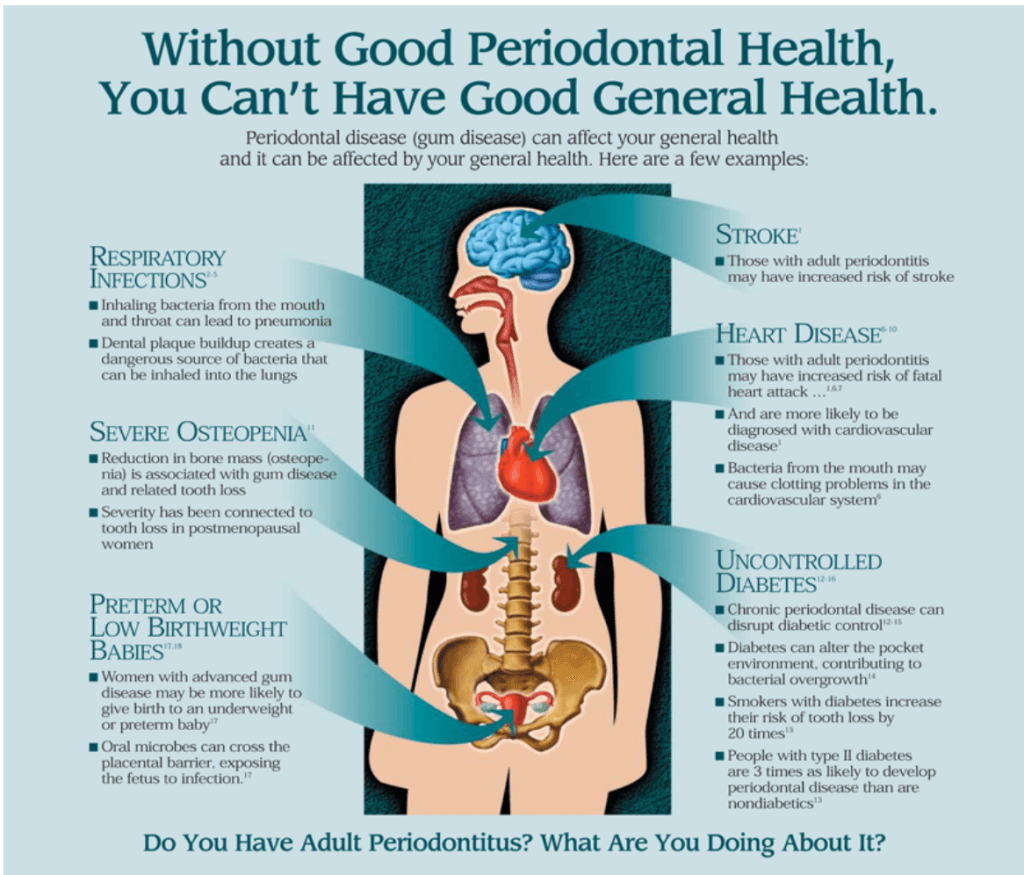Oral health is essential to general health and well-being. A healthy mouth enables:
- nutrition of the physical body
- enhances social interaction
- promotes self-esteem and feelings of well-being
Facts about Gum Disease
- affects 50-90% global population
- it destroys the supporting tissues around our teeth
- can lead to tooth loss
- impacts quality of life
- men (56.4%) exhibit a higher prevalence of gum disease than women (38.45%)
- incidence increases with age by 41%
- In the absence of good oral hygiene, (which includes brushing and cleaning in between the teeth) most people will develop gingivitis.
Stages of Gum Disease
Dental plaque is a collection of bacteria that forms on our teeth on a daily basis and when not removed effectively can lead to cavities and gum problems. Our teeth are supported in the jaw by bone and gum tissue. Your dentist or hygienist will perform an analysis of your gums to assess whether you have gum disease by probing with a measuring device. There are two stages to gum disease, gingivitis and periodontitis.
Gingivitis: Superficial inflammation of the gum tissues
Periodontitis: The destruction of the supporting structures around the teeth. This is divided into a further 3 categories:
- early periodontitis
- moderate periodontitis
- advanced periodontitis
Men
Since men are at higher risk of developing heart disease than women, maintaining good gum health is of great importance in order to reduce the risk
- Gum disease and heart disease are both chronic inflammatory conditions.
- Research highlights gum disease and heart disease are both associated.
- Gum disease may increase the risk of heart disease.
International research also shows that men with a history of gum disease are 14% more likely to develop cancer than men with healthy gums:
49 percent more likely to develop kidney cancer
54 percent more likely to develop pancreatic cancer
30 percent more likely to develop blood cancers
Women
Many women are unaware of the significant impact that various life stages have on the health of teeth and gums. Hormones have enormous impact on women at various life stages.
- puberty – increased blood supply to the gums due to the increased levels of progesterone and possibly oestrogen may contribute to the gums reacting to plaque toxins.
- menstruation – hormonal changes during the menstrual cycle may cause red swollen gums, swollen salivary glands or bleeding gums.
- pregnancy – increase in progesterone may cause inflammation of the gums and women can develop pregnancy gingivitis. Studies show there are potential adverse pregnancy outcomes for women with gum disease. These are: low birth weight of the new born; and pre-term labour.
- menopause – many oral changes can occur as a result of ageing. Medication and hormonal changes may alter taste buds; increase sensitivity to hot and cold foods and drinks; experience burning sensations or dry mouth due to decrease in salivary flow.
Children and Adolescence
It’s common for children to form gingivitis but less common for them to develop more serious forms of gum disease. The gums will generally bleed easily when brushing and flossing.
Four basic signs will alert you to gum disease in your child:
- Bleeding: Bleeding gums during tooth brushing, flossing or any other time
- Puffiness: Swollen and bright red gums
- Recession: Gums that have receded away from the teeth, sometimes exposing the roots
Prevention of Gum Disease
Visit your dentist and hygienist: Make sure you are examined by your dentist and have your teeth cleaned by a dentist or hygienist at least two times per year, in order to maintain excellent oral health.
Brushing: Use a soft bristled, manual or electric tooth brush. Brush 2-3 times daily and remember to brush your tongue as it also carries bacteria.
Interdental cleaning: Cleaning in between your teeth must be done daily. There are many products that can assist you with this process.

